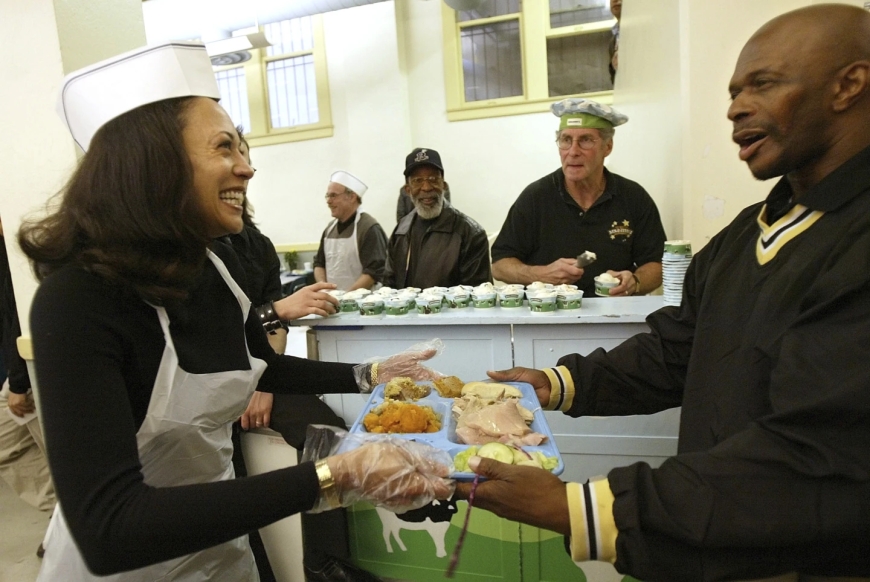Trump's Comments on Kamala Harris Highlight Misunderstanding of Code-Switching

Kamala Harris's versatility as a politician is evident in her ability to navigate various cultural and social contexts with ease. As the first Black woman and Asian American to serve as vice president, Harris can seamlessly transition from grilling Supreme Court nominees to hosting Diwali celebrations or engaging with an HBCU-styled marching band. This skill, known as code-switching, allows her to connect with diverse audiences and effectively communicate her message.
Harris, born to Jamaican and Indian immigrants, has honed this ability as a survival strategy in a nation where race and identity significantly impact social acceptance and professional success. Code-switching involves adjusting one's speech and behavior to resonate with different cultural contexts, a practice familiar to many people of color.
During a recent interview at the National Association of Black Journalists, former President Donald Trump questioned Harris's authenticity, suggesting she manipulates her racial identity for political gain. His remarks reflect a lack of understanding of code-switching and a broader assumption that whiteness, often associated with standard English, is the normative standard in American politics.
Christine Chen, co-founder and executive director of APIAVote, emphasized the importance of embracing multiple identities. "We need to be celebrating our whole selves, which means we need to celebrate all of our identities," said Chen. "The more that a candidate can embrace their multiple identities, I think that’s a way to connect with different communities and different people who identify on different issues that you stand on."
Trump's insinuation that Harris is inauthentic because she embraces both her Black and Indian heritage is not only unfounded but also ignores the complex realities of multiracial identities. Shereen Marisol Meraji, a former co-host of the NPR podcast “Code Switch” and an assistant professor at UC Berkeley, highlighted the challenges multiracial individuals face in a society that often demands they choose one identity over another.
"The ability to code-switch and go into different communities ... it is a huge asset," said Meraji. "And I think for people who are in competition with Kamala Harris, it’s also quite threatening."
The practice of code-switching is not exclusive to politicians of color. It is a valuable communication tool that can help ensure fair treatment, access to services, and professional opportunities in a society still grappling with systemic racism. For Harris, her ability to connect with different cultural groups is not a political strategy but a reflection of her lived experience.
During the interview, Rachel Scott of ABC News countered Trump's claims by highlighting Harris's deep connections to the Black community, including her education at Howard University and her membership in the historically Black sorority Alpha Kappa Alpha. These aspects of her biography, along with her parents' involvement in the Civil Rights Movement, underscore her authentic engagement with her heritage.
Harris has consistently embraced her multiracial identity throughout her career. In 2003, she openly discussed her Indian and African American heritage, stating, “My Indian heritage is just as strong as my African American heritage. One does not exclude the other.” As California's attorney general, she frequently referenced her cultural background and its influence on her values and work.
Trump's comments echo his previous attempts to delegitimize the racial identity of political opponents, reminiscent of his "birther" conspiracy against former President Barack Obama. His 2024 running mate, Senator JD Vance, also criticized Harris, accusing her of changing her accent to appeal to different audiences—a common but often misguided critique of politicians of color.
Historically, white politicians have also engaged in code-switching with varying success. Hillary Clinton and Harry Reid faced scrutiny for their attempts to adapt their speech in front of predominantly Black audiences. However, for white politicians, the ability to code-switch has not been as crucial for career survival as it is for politicians of color like Harris.
Chen concluded that politicians can build authentic relationships across diverse communities by showing genuine compassion and responsiveness to constituents' needs. "Whether you are white or Black or any other identity, how you show up in the community will determine whether or not it’s an authentic relationship," she said. "You’re going to be able to address their concerns more effectively because you’re actually more educated and understand what they’re going through."
This ongoing dialogue about race, identity, and authenticity underscores the complexities of American politics as the nation moves toward the 2024 election.













































